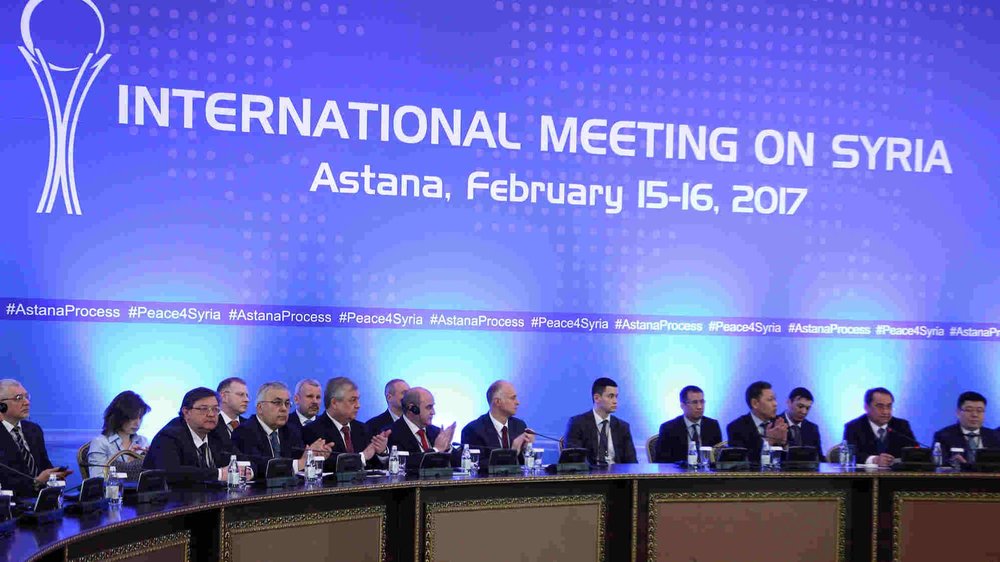Russia-Turkey-Iran consultations on Syria kick off in Astana

TEHRAN - A two-day international meeting between Iran, Russia, and Turkey on settling the Syrian crisis is underway in Astana, Kazakhstan.
The meeting which started on Tuesday, March 14, is between the countries acting as the guarantors of the Syrian ceasefire.
The Syrian government is represented in the talks, however, the armed opposition group has boycotted the third round of the Astana talks.
“Intense consultations between the Russian and Turkish sides, the Russian and Iranian sides are being held today,” Kazak Foreign Minister Kairat Abdrakhmanov told reporters after a government meeting on Tuesday.
He added that the participants in the meeting plan to discuss ceasefire areas in Syria.
“The guarantor countries (Russia, Iran, Turkey) have informed us that at the current round of talks, ceasefire areas and the establishment of a working group for exchanging information about prisoners will be discussed. Besides, the meeting’s participants will also discuss the demining of areas where important cultural sites protected by UNESCO are located. In addition, the meeting’s agenda includes some military issues to be reviewed by experts,” Abdrakhmanov explained.
Setting up a workgroup for exchange of prisoners of war in Syria will be one of the central issues at the international meeting in Astana.
“The guarantor countries say provision on the reconciled areas and on a workgroup for exchange of information on prisoners of war will be among the issues under discussion,” Abdrakhmanov said, commenting on the meeting.
The consultations on March 14 are preliminary. The plenary session of the international meeting on Syria is scheduled for March 15. The Russian delegation is led by Special Presidential Envoy for the Syrian Settlement, Alexander Lavrentiev. Syria’s Ambassador to the UN, Bashar Jaafari, leads the Syrian delegation. Iran’s delegation is headed by Deputy Foreign Minister for Arab-African Affairs Hossein Jaberi Ansari.
Rebels boycott talks
The Syrian opposition has announced that it will not attend the peace talks, blaming what they called Russia’s unwillingness to end air strikes against civilians in rebel-held areas and its failure to put pressure on the Syrian army to abide by a widely violated ceasefire.
Osama Abu Zaid, a spokesman for the rebels, said they had taken a final decision not to go to the talks. “Currently the decision is not to go as a result of Russia continuing its crimes in Syria against civilians and its support of the crimes of the Syrian regime,” he said, adding that they had informed Turkey, the main backer of the rebels, of their decision.
On Saturday, the Syrian rebel groups called for the postponement of the Astana peace talks and said that further meetings would depend on whether the Syrian government and its allies adhered to a newly declared ceasefire between March 7 to 20.
The rebels blame Russia for “not living up to its commitments”. “The main demand is stopping the bombardment and displacement of people,” Coloner Ahmad Othma, who heads the Turkish-backed Sultan Murad rebel brigade, added.
The Syrian government for its turn accused Turkey of breaking its commitments to the peace talks as Ankara-backed rebel groups boycotted the third round of meetings.
“When one of the three guarantors breaks their commitment – and I mean Turkey – this means that Turkey must be one that is asked about the non-attendance or participation of these armed groups,” Ambassador Jaafari said in broadcast remarks from astana.
The diplomat said the government’s delegation expects the Astana meeting to be fruitful. “We have come here to speak with our allies – Iran and Russia,” he said. “We expect a positive outcome of the talks, the success of the Astana process.”
Lavrov: Opposition’s reasons ‘unconvincing’
Russian Foreign Minister Sergey Lavrov called the reasons cited by the opposition for non-participation “unconvincing” and said their decision came as a surprise.
“We are reviewing the latest news with colleagues from the Ministry of Defense. We believe that the reasons that were mentioned as impeding the participation of the armed opposition in the following round of the Astana talks are not convincing,” Lavrov said.
Lavrov stressed that the number of ceasefire violations in Syria has recently been decreasing, but separate incident can occur.
“These violations have never been reduced to zero, this is a natural process, and there will always be some disruptions. The most important thing is that the number of these violations is much smaller than before the signing of the relevant agreements in late December last year,” he said.
Lavrov also said that the Russian Defense Ministry was in touch with Syrian rebel leaders who boycotted the talks, the Interfax news agency reported. He said Russia was dealing with the situation.
The Kremlin closely follows the progress of the negotiations on the Syrian settlement in Astana, the press secretary of the Russian president, Dmitry Peskov, has announced. He stressed that Moscow initially did not expect the process of the consultations to be easy.
“Of course, we are following (the negotiations),” he said, answering a question about the progress of the Astana talks. “We consider this to be an extremely important negotiation process”, Peskov added.
KB/PA
Leave a Comment